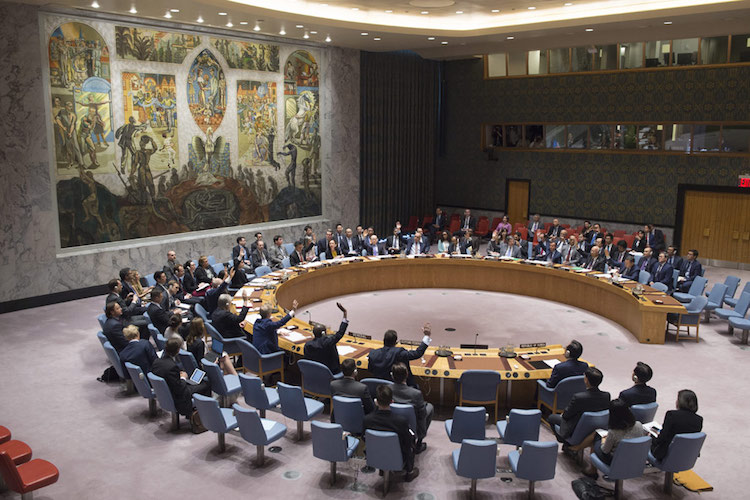By J Nastranis
UNITED NATIONS (IDN) – Disarmament, non-proliferation and nuclear security have been the critical priorities of Kazakhstan’s national policy since the Central Asian republic’s independence in 1991 and from the time of joining the United Nations in March 1992.
Also as a non-permanent member of the Security Council for two years beginning January 1, the country has been working with unrelenting determination to promote disarmament and non-proliferation as the sine qua non of the world body.
“The position of Kazakhstan remains stable and consistent,” Ambassador Kairat Umarov, Kazakhstan’s Permanent Representative to the UN in New York, said at the UN Security Council (UNSC) meeting on June 2.
“We condemn in the strongest terms any launches of ballistic missiles in flagrant violation of all relevant UNSC resolutions. Such actions undermine our common international effort to strengthen regional and ultimately international peace and security,” Ambassador Umarov added.
According to UN News, so far this year, the DPRK has conducted nine ballistic missile tests, including one on May 29. In response, Council members have issued seven press statements, most recent one on May 22, condemning the country’s actions and expressing its readiness to take further significant measures, including sanctions.
Describing the denuclearization of the Korean Peninsula a key element in preserving broader security across Asia, Ambassador Umarov declared: “Possession of nuclear arms by the North Korean regime will create a precedent that will undoubtedly lead to an escalation in the regional arms race, and given the temptation, might naturally cause further proliferation to balance DPRK’s nuclear threat.”
He urged DPRK – an acronym for the Democratic People’s Republic of Korea – to “refrain from actions that have a negative impact on the nuclear disarmament & non-proliferation process and pose a threat to both regional and global security.”
Ambassador Umarov urged the DPRK leadership to emulate Kazakhstan, which had closed the second largest nuclear test site and renounced the fourth largest nuclear arsenal in the world. “My country’s non-nuclear status is the most convincing example that non-nuclear way of state development is the only promising one. We call on the DPRK to opt for the same choice.”
Kazakhstan is convinced that there is no other option but collective commitment to international obligations taken in accordance with Security Council resolutions. “We would like to give a reminder that the principal position of Kazakhstan is not only the most severe condemnation of the use of WMD (weapons of mass destruction) by any party but also the resolution of conflicts through dialogue.”
While expressing its steadfast support for the June 2 Security Council decision to “extend the number of individuals and entities targeted by sanctions first imposed under resolution 1718 (2006) – an asset freeze and travel ban for those involved in the DPRK’s nuclear-weapon programme,” Kazakhstan pleaded for “balanced and responsible actions that would not lead to irreversible consequences.”
Calling on all parties concerned “to refrain from actions that could increase the risks of a military escalation and further tensions in the region,” Ambassador Umarov said: “My country strongly believes that at this critical stage the Security Council as the single body entrusted to maintain international peace and security should continue to preserve its unity on this important issue.”
Ambassador Umarov’s emphasis on strict adherence to the UN sanctions regime and the need to resolve the conflict through dialogue echoed the statement by Kairat Abdrakhmanov, the Kazakh Minister of Foreign Affairs, at the Security Council’s High-Level Open Debate on ‘Nonproliferation/DPRK’ on April 28.
Kazakhstan brings “the same passionate commitment to nuclear non-proliferation as one of our firm principles, goals and priorities of our work as envisioned by President Nursultan Nazarbayev in his address at the 70th session of the UN General Assembly in September 2015 and his Manifesto ‘The World. The 21st Century’,” Abdrakhmanov said.
Kazakhstan is still struggling with the devastating legacy of the ‘Cold War’ between the two ideological blocks led by the then Soviet Union and the U.S. This is why the closure of the second largest nuclear test site and renouncement of the fourth largest nuclear arsenal in the world remains one of the greatest achievements for Kazakhstan, Abdrakhmanov added.
“I believe that all of the above gives Kazakhstan a strong moral right to call upon all Member States to apply every effort in resolving this troublesome situation. Achieving this goal requires, above all, intensified dialogue between all stakeholders in regional and global security,” the Kazakh Minister of Foreign Affairs said.
He added: “My country’s non-nuclear status is the most convincing example that non-nuclear way of state development is the only promising one. We call on the DPRK to opt for the same choice. It has been proven that there is no situation for which there is no peaceful solution, and North Korea is no exception. As an example, in 2013 Kazakhstan’s status as a trusted mediator allowed to facilitate the talks on the Iranian nuclear program, which consequently contributed to the resumption of negotiations of the ‘P5+1’ and Iran.”
Abdrakhmanov expressed his conviction that “there is no other option but collective commitment to international obligations taken in accordance with Security Council resolutions.” Kazakhstan believes that this is the right time and is ready to work with all Member States towards eliminating the nuclear threat for the sake of our world, he said.
Complete nuclear disarmament and the abandonment of the DPRK’s nuclear ambitions could be ensured by truce backed by permanent members of the Council ensuring the political and military stability on the Korean Peninsula. Close engagement with the Asia-Pacific community will bring DPRK significant benefits for choosing the path of peaceful co-existence, said the Kazakh Foreign Minister. “Such approach, combined with a comprehensive and holistic regional strategy will ensure stability for the country, Peninsula and the wider sub-region.” [IDN-InDepthNews – 4 June 2017]
Photo: Security Council meeting on Non-proliferation-Democratic People’s Republic of Korea. UN Photo/Eskinder Debebe
IDN is flagship agency of the International Press Syndicate

